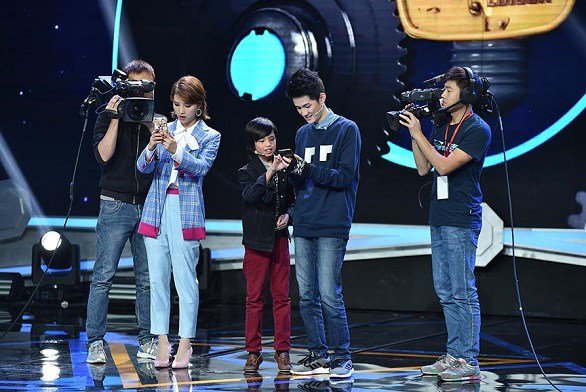
Australian Yuma Soerianto (middle) shows the apps he created to two Junior Edison guests. (Photo provided to China Daily)
A reality-TV show about young inventors from home and abroad has captivated public attention recently.
Each episode of Junior Edison features innovations by four young people in areas such as artificial intelligence, biotechnology and engineering.
The series began to broadcast on Shanghai Television earlier this month.
Contestants were selected from over 1,000 candidates from 32 countries and regions who submitted projects to the organizers-the Shanghai Science and Technology Commission, the Shanghai Municipal Education Commission and Shanghai Television Station.
"It's meaningful for top teenage inventors from around the world to gather together and bring vitality to Shanghai, which is on its way to becoming a global center of scientific and technological innovation," the show's director Wang Ning says.
"We believe the show, which focuses on high and new technologies created by the young generation, will foster better science education and provide inspiration for the city, and encourage more people to spontaneously invent and innovate."
Li Moumurong, an 8-year-old from Shijiazhuang, Hebei province, invented two sets of garments for children and adults respectively that reveal the location of the body's acupoints.
Moumurong, whose ancestor was an imperial doctor during Qing Dynasty (1644-1911) emperor Kangxi's reign, started learning traditional Chinese medicine in early childhood.
He says he could recognize over 1,000 medicinal herbs by the age of 3.
He marked the acupoints along the four most important channels-those for the gallbladder, spleen, stomach and liver-with small, color-coded steel balls that users can press to massage.
Taiyuan city, Shanxi province, native Wang Wenhe invented an exoskeleton-motion system using 3-D printing technology.
The 17-year-old's invention imitates the movements and structures of humans' ulnas and radiuses, which enables the exoskeleton to move at the joints. The invention involved technical challenges in several cutting-edge fields, including materials and biomechanics.
Wang says he hopes it can help people who are elderly or have disabilities to become more mobile.
Indian Koushika Srilakshmi invented a tiny space satellite using the latest nanophase materials. It's 3.8 centimeters high and weighs 64 grams. The satellite has been launched and recovered with the help of NASA.
The 18-year-old says her ambition is to become India's first female astronaut.
Australian Yuma Soerianto, who appeared in the first episode, developed six smartphone applications, including a weather app, a food-rating app, games and a calculator for kids. The 10-year-old was the youngest invitee of Apple's Worldwide Developers Conference in San Jose, California, last year.
On Junior Edison, Yuma presented an augmented-reality block-stacking game that he had created and has since been downloaded over 30,000 times.
"With AR technology, you can play the game with the real surroundings or any virtual scenes as the background of the game on the screen of your phone," the Melbourne native says.
Zhang Yizhong, director of Shanghai STEM Cloud, an online-education platform for the disciplines of science, technology, engineering and mathematics, says the app may seem uncomplicated but involves deep knowledge of 3-D modeling, data acquisition, image control and scene fusion.
Yuma, who started to teach himself programming at age 6, has also uploaded an online course called Anyone Can Code. About 7,000 people have subscribed so far.
American Kevin Rao presented an "intelligent doctor" that can predict lung cancer patients' survival rates and provide medical suggestions.
Rao says he collected the medical data of more than 26,000 patients from the United States' National Can-cer Database and set up a model that uses AI to learn.
The 16-year-old from Richmond, Virginia, says his "intelligent doctor" involves four computer algorithms that are usually applied in big data calculations and analyses, data classification, junk-mail handling, and speech and image recognition.
"The four algorithm methods are like four doctors who excel in their different professional fields holding consultation for a patient, and-through massive calculation and case comparison-the system will come up with a conclusion for the disease and a treatment plan that is most suitable for the patient," Rao explains.
His favorite junior high teacher's death inspired the project, he says.
"I hope the 'intelligent doctor' will not only help physicians make more accurate judgments about each individual case but also will boost the detection and diagnosis rates of cancer patients to benefit mankind."
Two Shanghai doctors came on the show to challenge him with two patients' cases. Rao's diagnoses matched the doctors'.
Yu Lizhong, a contest judge and chancellor of New York University Shanghai, says the young students are empowered with open minds, action and confidence when confronting challenges in such competitions.
"These intangible characteristics will help them to grow up more quickly," he says.


















































